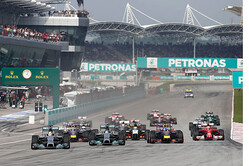


23/04/2014
NEWS STORY
 Formula One's profits fell by £81.2m to £169.9m last year driven by a new deal with the 11 teams according to an article in the Daily Telegraph by Christian Sylt.
Formula One's profits fell by £81.2m to £169.9m last year driven by a new deal with the 11 teams according to an article in the Daily Telegraph by Christian Sylt.
In the year to 31 December 2013 the teams' prize money increased 6.1% to a record £473.8m making it the single biggest cost for F1's Luxembourg-based parent company Delta 2.
It calls into question the claim, which has long been advocated by some teams, that F1's controlling shareholder, the private equity firm CVC, gets an unfairly-high share of the spoils. In fact it is the latest in a series of revelations which has cast doubt over the validity of this claim.
The first was in analysis in the CityAM newspaper, and reported in detail by Pitpass, which revealed that CVC only takes home 8.4% of F1's annual revenue compared to 44% to the teams.
Next, came analysis in Forbes magazine () showing that since CVC acquired F1 in 2006 the teams have been paid a total of £2.2bn ($3.7bn) in prize money which is nearly as much as the £2.4bn ($4bn) that CVC has received from dividends and the sale of stakes in F1. If the dividends and share sales of the teams over the same period was included in their total it would far eclipse the amount that CVC has made from F1.
Now we find out that their prize money has increased to such a high amount that it has contributed to F1's profits reversing by £81.2m. Yet still some of the teams complain that they are not getting enough money from F1.
Last year Pitpass revealed that the teams' prize money had accelerated nearly 400% over the previous five years and F1's boss Bernie Ecclestone quipped that they "have all got more money than God." It is no exaggeration.
F1 fans can be excused for not feeling sympathetic towards teams which say they aren't getting enough. It really makes you wonder why they say they need more. In fact, there is a good reason for it.
For most businesses, the yardstick of success is profit but not F1 teams. They tend to break even, or sometimes make a loss, as they spend all of the money they receive in a bid to win on track. This leaves them with very little profit and little money in the bank to tide them over if there is a dip in their performance which in turn reduces their prize money and sponsorship. The only solutions available are to get into debt, to get money from their owners or to demand more money from F1. If their performance does not pick up then the first two solutions eventually lead to the team going under whilst the latter is not guaranteed to come off.
The other route is to demand a budget cap which would involve the teams going cold turkey on their addiction to spending virtually all the money which comes in. However, budget caps and resource restrictions only treat the symptom and not the problem itself which is that the teams cannot resist spending almost all the money that they receive. Until that is resolved their costs will continue to accelerate and there will forever be a question mark over whether they will all be able to survive.
The teams' prize money is calculated as a percentage of F1's underlying profits and their new commercial deals that began last year boosted their share from 59.6% to 63%.
Further pressure was put on F1's profits by the beginning of a new agreement with the FIA. The annual fee it receives from F1 increased four-fold last year to an estimated £25m. There was less money coming in to pay it as the cancellation of a second Grand Prix in Spain led to Delta 2's revenue dropping 4.3% to £772m.
It left a total of 19 races in 2013 and although India and South Korea have been dropped this year, they have been replaced with new events in Austria and Russia.
F1's chief financial officer Duncan Llowarch says he is happy with the company's performance "taking into account the continuing effects of the global economic downturn on the countries staging the championship's events and in other territories with which the group does business." If the team payments were to increase yet again that outlook could be very different.